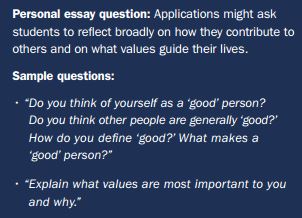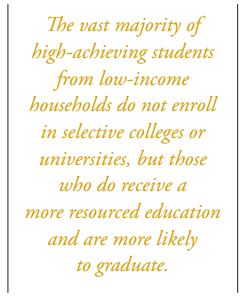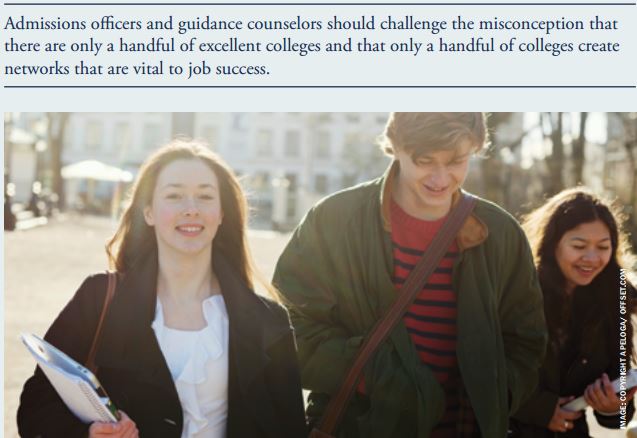Parents, teachers, college professionals, and students know the positive and negative effects of college admissions: from the joy of getting acceptances, to the intense pressure in applying, to the unending questions from well-meaning friends and family. Many professionals in the higher education field are also aware of the mental and  emotional stress placed on students and the advantage of more affluent students from more well-resourced schools. But, are times changing? Are colleges willing to change the criteria for college admissions? Maybe.
emotional stress placed on students and the advantage of more affluent students from more well-resourced schools. But, are times changing? Are colleges willing to change the criteria for college admissions? Maybe.
More than 80 college admissions professionals, high school counselors, and stakeholders have endorsed a new college admissions report released this week. The report, entitled Turning the Tide: Inspiring Concern for Others and the Common Good Through College Admissions, aims to address these issues. The report was released during a New York City panel and is supposed to lay out “a blueprint for addressing three of the most intractable challenges facing college applicants today: excessive academic performance pressure, the emphasis on personal achievement over good citizenship, and the uneven opportunities available to students of varying income levels and backgrounds”.
The report was also endorsed by the Board of Directors of the Coalition for Access, Affordability, and Success. In September, the Coalition announced its intention to make the college admissions process more equitable by introducing a new application intended to reduce student stress. However, many in the college admissions world, including myself, were troubled by the Coalition’s goals and steps toward that goal. The Coalition platform would serve as an application website and source of information to those colleges and its prospective students, but they also boast of a “digital locker” for students to store information and creative works starting in 9th grade. It’s easy to see how affluent families will interpret this as another task on their to-do list for college admissions, while students with poorly-resourced schools and counselors, might not even hear about it.
Many expressed concern that the Coalition is simply another step to make the elite even more so. Jon Boeckenstedt, the associate vice president of enrollment management and marketing at DePaul University in Chicago, said “A group of America’s most high-profile private colleges, already obsessed with prestige, are attempting to grab more,” in The Washington Post. He added that they were “making hollow promises to low-income kids they could already serve if they really wanted to.”
Possible Changes and Recommendations for College Admissions
The Turning the Tide Report had many suggested changes, along with specific recommendations for each intended for college applications and students. These recommendations are just that: recommendations. They might not actually take effect, but parents, students, and counselors should pay attention for a possible shift in focus which would affect high school students applying in the coming years.
Focus #1– “Promote meaningful contributions to others, community service, and engagement with the public good”
Recommendations:
- Meaningful, consistent community service
- College action that takes on challenges in the community
- Authentic experiences with diversity
- Service that develops gratitude and a sense of responsibility for the future
Focus #2-“Emphasize authentic engagement over personal achievement”
“Yes, we want students who have achieved in and out of the classroom, but we are also looking for things that are harder to quantify: authentic intellectual engagement, a concern for others and the common good.” said Yale Dean of Undergraduate Admissions Jeremiah Quinlan.
Recommendations:
- Contributions to one’s family
“These students may be caring for a sick relative, supervising a younger sibling, helping to run a household or working after school to support their families. Often students can’t undertake conventional high school extracurricular activities and community involvement because of these important obligations. At the same time, these family responsibilities themselves are often building blocks of ethical character.”
- Student’s awareness and contribution to others
“The report highlights a common misconception that volunteering for certain high-profile causes or traveling to exotic countries will make an application stand out. It will, but for the wrong reasons: namely that it looks inauthentic”.
Focus #3– Level the playing field for economically diverse students and reduce excessive  achievement pressure
achievement pressure
Recommendations:
- Prioritize quality, not quantity of extracurricular activities
- Awareness of overloading of AP/IB courses
Colleges are not stating that students don’t need to take AP courses. They are stating that there is no need to overburden yourself with excessive amounts of AP or IB courses. Instead of an AP course in every subject for all years, students can focus on more in-depth knowledge and practice in just a few subjects.
- Discourage over-coaching
Over-coaching can take many forms: from parents who write or overly “assist” with college essays to high school counselors who suggest students take classes that are good on applications but not of interest, to college consultants who tell students what to write about or overly ‘package’ students.
- Options for reducing test pressure
High scores on the SAT or ACT correlate with high family income, in part because performance on these tests can be improved with the special classes and private tutoring that money buys. Some colleges are going test-optional, but all students should be reminded that taking a standardized test more than twice is not recommended.
- Expand perceptions of “good” colleges and instead focus on “best fit” for students

Effects and Responses from Colleges
Some colleges are already taking notice and making changes based on the report:
Yale University said they will add a question to the Yale application asking students to “reflect on engagement with and contribution to their family, community and/or the public good,” and would also advocate for more flexibility in the Common and Coalition Applications so that schools can customize how students discuss extracurricular activities in their applications.
The University of Virginia is also in agreement with the report. “We support Turning the Tide because we philosophically agree with many of the principal points in the document, [like] promoting, encouraging, and developing good citizenship, strong character, personal responsibility, [and] civic engagement in high school students,” says Gregory Roberts, the school’s dean of admissions.
Stephen Farmer, at the University of North Carolina at Chapel Hill, praised the report as consistent with his school’s desire “to be humbler and more alert to the many ways in which people can stake a claim on a place here.”
Conclusion
The conclusion is summed up well in Executive Summary of the report:
“As a rite of passage for many students and a major focus for many parents, the college admissions process is powerfully positioned to send different messages that help young people become more generous and humane in ways that benefit not only society but students themselves. Yet high school students often perceive colleges as simply valuing their achievements, not their responsibility for others and their communities. While some colleges have diligently sought to convey to applicants the importance of concern for others and the common good, many other colleges have not.”
